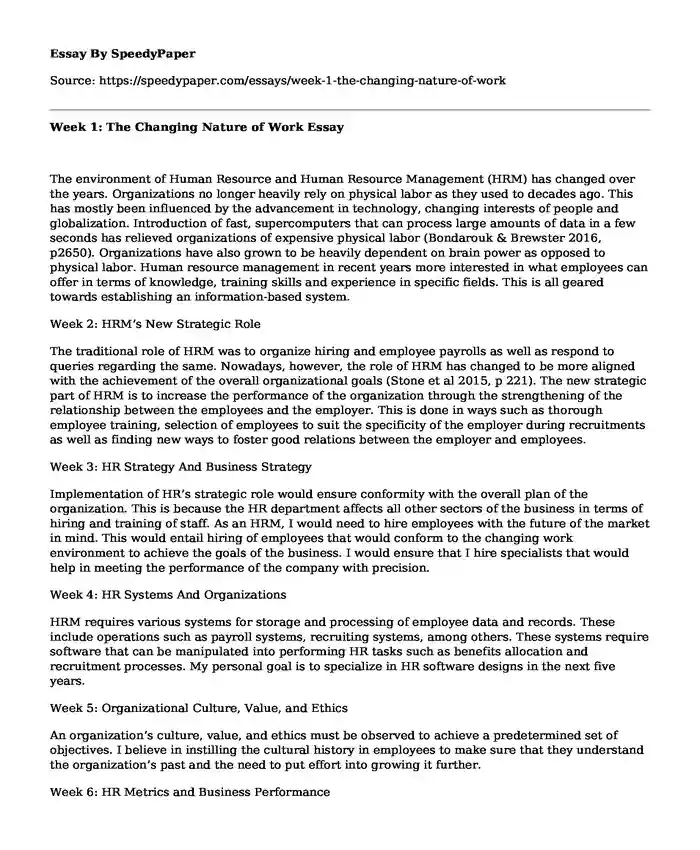
| Type of paper: | Essay |
| Categories: | Company Culture Economics Literature Analysis |
| Pages: | 3 |
| Wordcount: | 669 words |
The environment of Human Resource and Human Resource Management (HRM) has changed over the years. Organizations no longer heavily rely on physical labor as they used to decades ago. This has mostly been influenced by the advancement in technology, changing interests of people and globalization. Introduction of fast, supercomputers that can process large amounts of data in a few seconds has relieved organizations of expensive physical labor (Bondarouk & Brewster 2016, p2650). Organizations have also grown to be heavily dependent on brain power as opposed to physical labor. Human resource management in recent years more interested in what employees can offer in terms of knowledge, training skills and experience in specific fields. This is all geared towards establishing an information-based system.
Week 2: HRM's New Strategic Role
The traditional role of HRM was to organize hiring and employee payrolls as well as respond to queries regarding the same. Nowadays, however, the role of HRM has changed to be more aligned with the achievement of the overall organizational goals (Stone et al 2015, p 221). The new strategic part of HRM is to increase the performance of the organization through the strengthening of the relationship between the employees and the employer. This is done in ways such as thorough employee training, selection of employees to suit the specificity of the employer during recruitments as well as finding new ways to foster good relations between the employer and employees.
Week 3: HR Strategy And Business Strategy
Implementation of HR's strategic role would ensure conformity with the overall plan of the organization. This is because the HR department affects all other sectors of the business in terms of hiring and training of staff. As an HRM, I would need to hire employees with the future of the market in mind. This would entail hiring of employees that would conform to the changing work environment to achieve the goals of the business. I would ensure that I hire specialists that would help in meeting the performance of the company with precision.
Week 4: HR Systems And Organizations
HRM requires various systems for storage and processing of employee data and records. These include operations such as payroll systems, recruiting systems, among others. These systems require software that can be manipulated into performing HR tasks such as benefits allocation and recruitment processes. My personal goal is to specialize in HR software designs in the next five years.
Week 5: Organizational Culture, Value, and Ethics
An organization's culture, value, and ethics must be observed to achieve a predetermined set of objectives. I believe in instilling the cultural history in employees to make sure that they understand the organization's past and the need to put effort into growing it further.
Week 6: HR Metrics and Business Performance
HR metrics are vital for the assessment of HR performance and its contribution to overall business performance. I was previously biased into believing that HR performance need not be assessed as long as the employee output is maximal. I have however found this not to be the case as factors such as employee turnover can affect the HR's planning and overall performance (Stone et al 2015, p230).
Week 7: HR's Role in Organizational Change
An effective HR system is key to the growth of any organization. I believe that change in any organization begins in the HR department. This is through engagement of employees in ways such as critical evaluation and assessment of competencies.
Week 8: The Future of HR
With the view of my experience in HRM, the future of HR will be heavily determined by how well organizations adopt new technology in recruitment and management of human capital. These technological advancements that every HRM should consider include artificial intelligence, data analytics on business websites as well as digital labor. All these are advancements from the traditional model of HRM.
References
Bondarouk and Brewster, 2016. 'Conceptualising the future of HRM and technology research.' The International Journal of Human Resource Management, 27(21), pp.2652-2671.
Stone, Deadrick, Lukaszewski, K.M. and Johnson, R., 2015. 'The influence of technology on the future of human resource management.' Human Resource Management Review, 25(2), pp.216-231.
Cite this page
Week 1: The Changing Nature of Work. (2022, Dec 23). Retrieved from https://speedypaper.net/essays/week-1-the-changing-nature-of-work
Request Removal
If you are the original author of this essay and no longer wish to have it published on the SpeedyPaper website, please click below to request its removal:
- Check City Branding Examples in Our Free Essay
- Marketing Essay Sample for Students on Branding
- Law Essay Example with the Analysis of Mr. Howard's Speech
- Paper Example on Evidence-Based Practice in Nursing
- Free essay on the program for gifted students in the Kingdom of Saudi Arabia
- Self-Awareness: Personal Traits. Paper Example
- Free Essay: Elaboration on the Role of Non-Health Factors in Behavior Change
Popular categories




